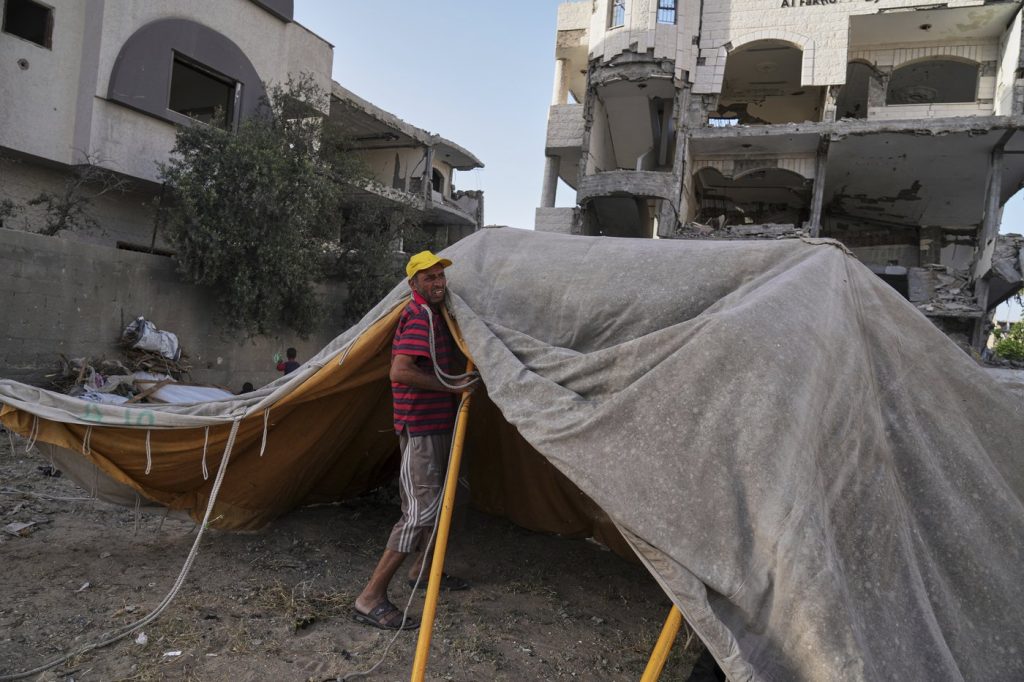GAZA CITY, Gaza Strip – The Abu Jarad family has once again faced the harrowing experience of displacement, marking the tenth instance since the onset of Israel's 19-month military campaign in Gaza. This recent uprooting has proven to be the most painful for the family as they navigate the hardships of war and instability.
In January 2025, during a brief ceasefire, Ne'man Abu Jarad, his wife Majida, and their six daughters joyfully returned to their home in northern Gaza, hopeful that their tumultuous journey might finally be over. They had previously traversed the length of Gaza multiple times, fleeing Israeli offensives. However, their hopes were short-lived as bombs began falling again weeks after their return, leading them to abandon their home once more.
Ne'man articulated the emotional toll of their decision to leave, describing it as “like executing yourself by your own hand.” His family has constructed makeshift tents in a rubble-strewn yard of a destroyed apartment building in Gaza City, where many Palestinians, displaced from their homes due to ongoing conflict, now seek refuge.
Since Israel broke a two-month ceasefire on March 18, 2025, and resumed military operations, at least 430,000 people have been forced to flee. This wave of displacement coincides with severe humanitarian challenges, including a blockade that restricts the entry of food, fuel, and medical supplies into Gaza, pushing countless others toward starvation. Ne'man and his family have witnessed the devastating effects of the blockade firsthand, with their nutritional needs only partially met amid a dire situation.
Reflecting on their initial return in January 2025, Ne'man described it as a return to “Paradise,” despite the damage to their home and the loss of most of their belongings. After months of living in tents, the family felt a renewed sense of belonging. However, the escalating violence quickly disrupted their fragile peace. With the military's resurgence in May, Ne’mans’ family faced intense bombardment, pushing them to flee once again.
Despite their reluctance to leave, the bombardments became unbearable. The fear and trauma gripped Ne'man's daughters, who expressed a desire to stay in their home. Yet, amid the chaos, the family decided to move to a relative's land in Manshiya, only to find themselves once again in the path of Israeli air and ground offensives.
After several nights of intense shelling, where a drone strike occurred perilously close to their makeshift tent, the family was compelled to flee once more. They traveled, burdened with backpacks and their remaining belongings, to Gaza City, where they found a lot next to a demolished apartment building to set up their new temporary home.
It took them three days to clear the rubble and erect tents. The family quickly adapted to their new life, establishing a rudimentary communal toilet and preparing minimal meals with the limited resources they could gather. As they faced dark nights filled with anxiety from the ongoing conflict, the daily struggle to find food persisted.
Now, as the Abu Jarad family contemplates their uncertain future amid relentless bombardments, the emotional toll weighs heavily. Ne'man reveals that his daughters have become dispirited, their hopes crushed by the recurring cycle of violence. Amid the despair, he articulates a profound connection to their homeland, asserting their refusal to abandon their land, despite the ongoing bloodshed.










